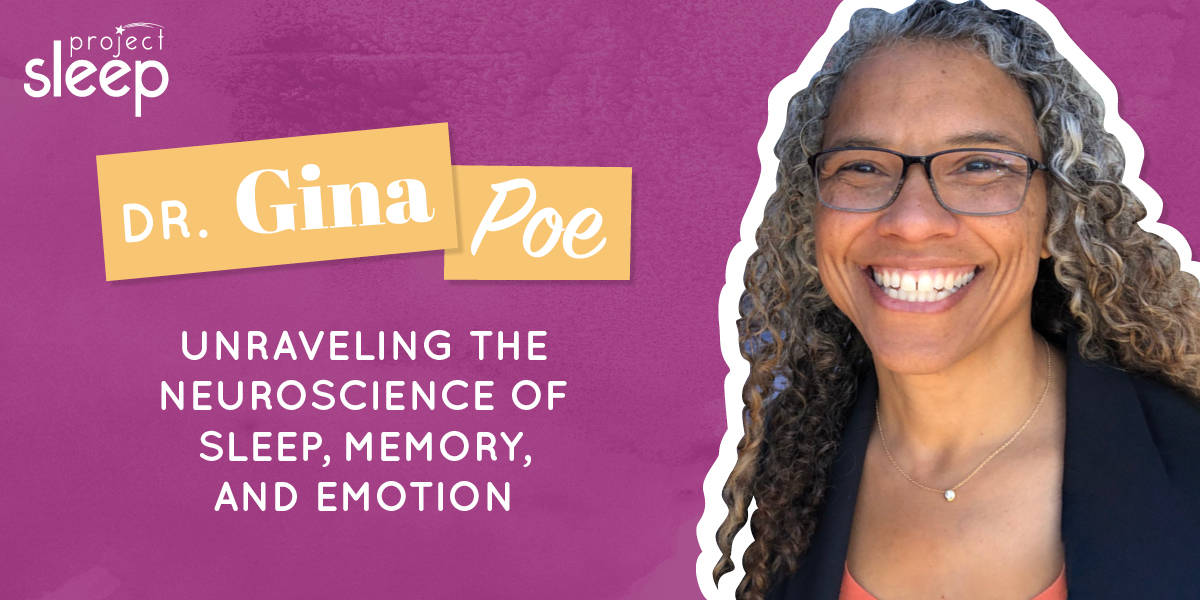Written by Anna Marr. Graphics by Eleanor Wales.
Dr. Gina Poe: Women’s History Month Sleep Leaders Part 3
March is Women’s History Month! Project Sleep is proud to celebrate the vital role of women in the sleep community through a series of feature profiles.

Meet Dr. Gina Poe!
Gina Poe, PhD, is a professor at UCLA, where she runs her lab in the Department of Integrative Biology and Physiology and the Department of Psychiatry and Biobehavioral Sciences. She is also the Director of Diversity in Outreach and Education at the Brain Research Institute. For decades, she’s been uncovering answers to one burning question: Is sleep for remembering or forgetting—or both?
After graduating from Stanford, Dr. Poe worked at a VA medical center as a research assistant on an Air Force-funded project, developing technology to detect loss of consciousness in pilots. This inspired her to explore her fascination with the brain and the nature of sleep by pursuing a PhD in Basic Sleep in UCLA’s Neuroscience Interdepartmental Program.
During her postdoctoral studies at the University of Arizona, she looked at aging-related memory problems and also sent four rats into space on NASA’s Neurolab mission—both of which led her to start her own passion project on the function of sleep for neural plasticity and learning. She was the first to show a mechanism underlying the long-observed role of REM sleep in learning and showed for the first time that REM sleep was both for strengthening new fragile memories and for forgetting unnecessary, redundant, or irrelevant information.
While teaching at Washington State University, Dr. Poe won her first major research grant from the National Institute of Mental Health, “REM Sleep and Memory” (now in its 20th year of renewal). She discovered that, during sleep, new memories were strengthened while old, consolidated ones were erased from the hippocampus to prepare for new learning the next day.
In fact, results from her lab’s studies suggest that a certain part of memory integration requires specific conditions unique to REM sleep. She identified the necessary levels of three neurotransmitters in REM sleep: acetylcholine, serotonin, and norepinephrine for proper memory consolidation and showed that memory replay during REM follows a specific pattern across the timecourse of consolidation that is completely unique to REM sleep.
“Sleep is as important as food, and it’s miraculous how well sleep matches the needs of our nervous system… While we sleep, our brains are not resting.” – Dr. Gina Poe told UCLA Health
After serving on the University of Michigan’s faculty, Dr. Poe has returned to UCLA to direct three university programs that prepare undergrads underrepresented in STEM fields. She also leads two national programs to support and facilitate the success of more students from underrepresented backgrounds in neuroscience, co-directing the Society for Neuroscience’s Neuroscience Scholars Program (NSP), which provides financial and mentoring support, and course-directing the Marine Biological Lab’s SPINES program, which provides technical and professional development training.
After four lab moves, three NIH grants, and numerous, often-cited publications, Dr. Poe and her lab, and her former trainees who now have labs of their own, continue to investigate memory and sleep in healthy males and females, and in disordered states such as PTSD, Alzheimer’s, and drug addiction. By unraveling how sleep serves memory consolidation, creativity, insight into difficult problems, the processing of traumatic memories, and mental health, Dr. Poe continues to make groundbreaking discoveries about the physiological mechanisms that make sleep a necessity for survival and health.





